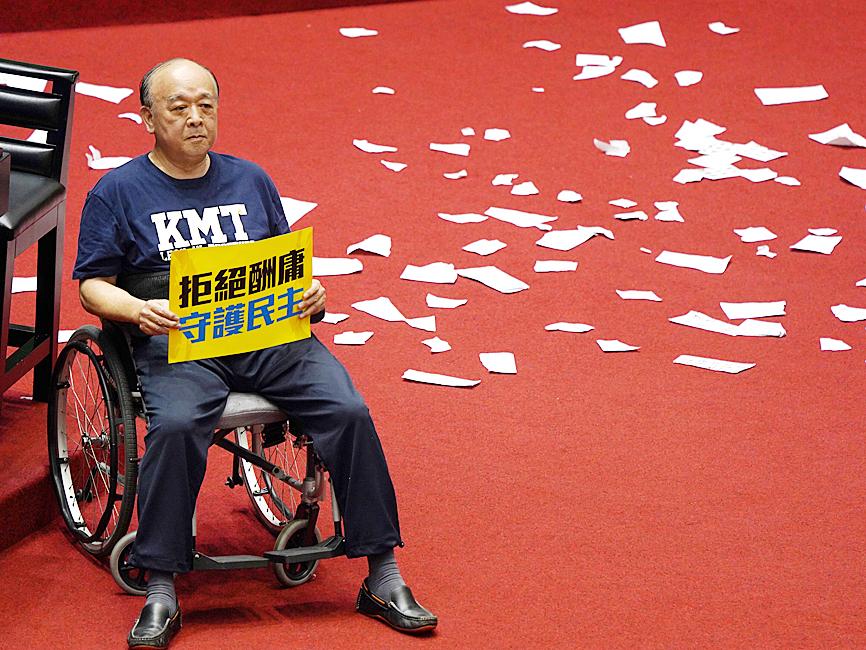Chinese Nationalist Party (KMT) Legislator Wu Sz-huai (吳斯懷) and 12 others were yesterday charged for their roles in a 2018 demonstration against military pension cuts that turned violent, the Taipei District Prosecutors’ Office said.
In the indictment, prosecutors say that Wu, then deputy head of a veterans’ group, and Wang Po-yun (王寶芸) of the Blue Sky Action Alliance encouraged violence when they spoke at a rally in front of the Legislative Yuan in Taipei on April 25, 2018.
Their speeches were found to have incited protesters to clash with police as people sought to break into the Legislative Yuan, they said.

Photo: CNA
The demonstration and violent clashes led to 32 police officers and 11 journalists being injured, an Executive Yuan statement said at the time.
Wu’s group, the “800 warriors,” had since February 2017 organized a series of protests over pension cuts, including camping outside the Legislative Yuan.
The 11 others were charged with obstructing officers in the execution of their duties and causing injuries, the prosecutors said.
In a statement, Wu called the indictment a distraction created by the Democratic Progressive Party as it pushes through the approval of former Presidential Office secretary-general Chen Chu (陳菊) as Control Yuan president.
Wu said that Chen was unfit for the post as her administration was censured and impeached by the Control Yuan several times during her time as Kaohsiung mayor.
He defended himself against the charges, saying that he always called for demonstrators to be peaceful and reasonable.
However, it was difficult to control the crowds when the protests involved various groups, he added.
It is regrettable that the prosecutors failed to act impartially, but he would undergo the judicial process in accordance with the law while continuing to protest against the current administration’s abuse of power, Wu said.

The Grand Hotel Taipei on Saturday confirmed that its information system had been illegally accessed and expressed its deepest apologies for the concern it has caused its customers, adding that the issue is being investigated by the Ministry of Justice Investigation Bureau. The hotel said that on Tuesday last week, it had discovered an external illegal intrusion into its information system. An initial digital forensic investigation confirmed that parts of the system had been accessed, it said, adding that the possibility that some customer data were stolen and leaked could not be ruled out. The actual scope and content of the affected data

‘LIKE-MINDED PARTNER’: Tako van Popta said it would be inappropriate to delay signing the deal with Taiwan because of China, adding he would promote the issue Canadian senators have stressed Taiwan’s importance for international trade and expressed enthusiasm for ensuring the Taiwan-Canada trade cooperation framework agreement is implemented this year. Representative to Canada Harry Tseng (曾厚仁) in an interview with the Central News Agency (CNA) said he was increasingly uneasy about Ottawa’s delays in signing the agreement, especially as Ottawa has warmed toward Beijing. There are “no negotiations left. Not only [is it] initialed, we have three versions of the text ready: English, French and Mandarin,” Tseng said. “That tells you how close we are to the final signature.” Tseng said that he hoped Canadian Prime Minister Mark Carney

POSITIVE DEVELOPMENT: Japan and the US are expected to hold in-depth discussions on Taiwan-related issues during the meeting next month, Japanese sources said The holding of a Japan-US leaders’ meeting ahead of US President Donald Trump’s visit to China is positive news for Taiwan, former Japan-Taiwan Exchange Association representative Hiroyasu Izumi said yesterday. After the Liberal Democratic Party’s landslide victory in Japan’s House of Representatives election, Japanese Prime Minister Sanae Takaichi is scheduled to visit the US next month, where she is to meet with Trump ahead of the US president’s planned visit to China from March 31 to April 2 for a meeting with Chinese President Xi Jinping (習近平). Japan and the US are expected to hold in-depth discussions on Taiwan-related issues during the

President William Lai (賴清德) yesterday bestowed one of Taiwan’s highest honors on Saint Vincent and the Grenadines (SVG) Ambassador Andrea Clare Bowman in recognition of her contributions to bilateral ties. “By conferring the Order of Brilliant Star with Grand Cordon on Ambassador Bowman today, I want to sincerely thank her, on behalf of the Taiwanese people, for her outstanding contribution to deepening diplomatic ties between Taiwan and SVG,” Lai said at a ceremony held at the Presidential Office in Taipei. He noted that Bowman became SVG’s first ambassador to Taiwan in 2019 and